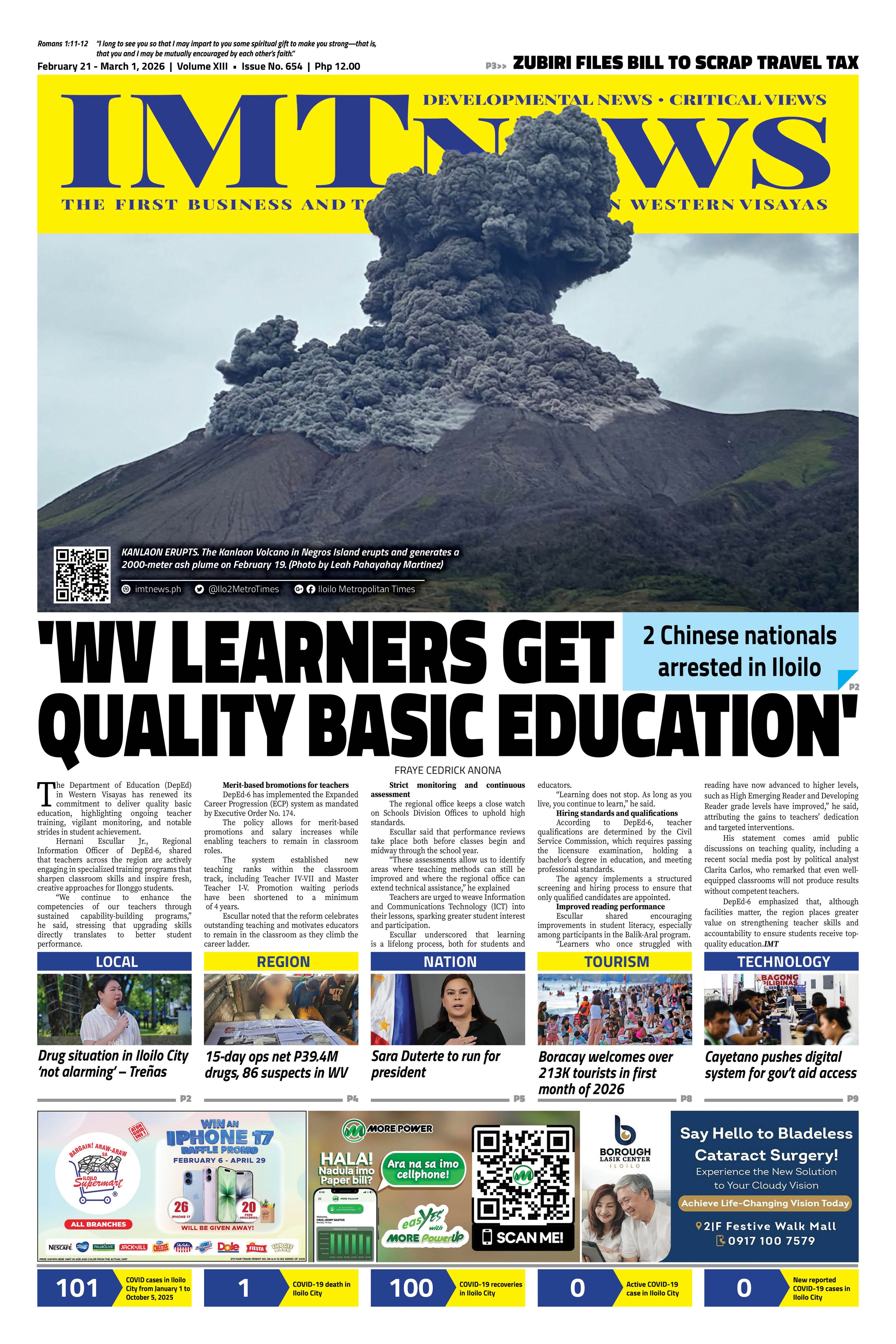The recent national data on functional illiteracy has cast a long, troubling shadow over the Philippines. Nearly one in three Filipinos between the ages of 10 and 64 is functionally illiterate — unable to comprehend basic written material or apply everyday arithmetic. What’s more unsettling is that this figure includes millions who have completed high school.
For a progressive province like Iloilo, a rising star in investment, tourism, and trade, this is not just an education issue. It is an economic alarm bell. And it’s one the business sector cannot afford to ignore.
Functional illiteracy is often seen as the government’s concern, best left to the Department of Education, local school boards, or NGOs. But this mindset misses the bigger picture. The young people struggling in our schools today will form the workforce that businesses depend on tomorrow. If we care about productivity, innovation, and economic resilience, then addressing functional illiteracy is not charity — it is strategy.
Why Business Should Step In
At its core, literacy is not merely about reading words on a page; it’s about unlocking human potential. Workers who lack reading comprehension or numeracy skills face steep barriers to learning new tasks, solving problems, managing information, or adapting to technology. This becomes a drag not only on individual lives, but on the productivity and competitiveness of entire industries.
For companies in Iloilo — from agri-businesses and manufacturing firms to retail chains, hotels, and BPOs — the cost of ignoring this problem will come due. It will appear as lower output, costly retraining, higher error rates, and narrower talent pipelines. The human capital that powers Iloilo’s economic future is being shaped now, in classrooms and homes across the province.
Beyond Donations: Toward Systemic Action
The private sector’s usual contributions — classroom repairs, computer donations, or scholarships — have made a positive impact. But if we are to face the depth of this crisis, we must go beyond project-based giving to long-term, structural engagement.
Here’s where businesses can make a transformative difference:
1. Tackle household poverty.
Poverty is the most stubborn root of educational failure. When parents struggle to put food on the table, children are often forced to sacrifice school time to help earn or take care of younger siblings. Businesses have the power to change this by creating stable jobs, offering fair wages, and promoting dignified work. A family with a decent income is a family that can keep its children in school, buy books, and provide the emotional bandwidth to support learning.
2. Support lifelong learning among workers.
Functional illiteracy doesn’t end at the school gate. Many adults in the workforce today were themselves failed by the education system. Businesses can step up by offering workplace literacy programs, digital skills training, and financial literacy workshops. These not only boost company performance but also empower parents to engage more confidently in their children’s learning.
3. Partner with schools and communities.
The private sector should work hand in hand with local schools, barangays, and LGUs to understand what students need — from school feeding programs to after-school tutoring or internet access. Imagine if companies set up “learning hubs” in their communities or mobilized employees to volunteer as reading mentors. This isn’t about corporate branding; it’s about investing in the next generation.
4. Champion family-friendly workplaces.
Parents need time, not just income, to support their children’s education. Businesses can help by offering flexible schedules, parental leave, or childcare support, allowing parents — especially mothers — to attend school meetings, help with homework, or simply read to their children at night.
5. Elevate literacy as a public value.
The business sector holds enormous cultural influence. It can use its platforms, marketing, and public engagement not just to sell products, but to promote reading, learning, and critical thinking as shared social values. Imagine local businesses sponsoring Hiligaynon or Kinaray-a storytelling festivals, public reading spaces, or mobile libraries.
Why Iloilo’s Future Depends on This
Iloilo is undergoing a remarkable transformation — a province balancing tradition and progress, heritage and innovation. But no amount of infrastructure, investment, or tourism promotion can substitute for the foundational strength of an educated, literate population.
We often talk about business sustainability in terms of environmental or financial metrics. But there is another kind of sustainability we must now embrace: human sustainability. How do we nurture, retain, and develop the talent that will carry Iloilo forward over the next generation?
Neglecting functional literacy is like building a house on a weak foundation — eventually, the cracks will show. But investing in people’s capacity to learn, understand, and contribute creates a workforce that is adaptable, resilient, and ready to drive Iloilo’s growth.
From Bystanders to Co-Creators of Change
What Iloilo needs now is not another round of finger-pointing. We need a new spirit of shared responsibility — where government, schools, families, and businesses work side by side.
For the business community, this means shifting from being bystanders to co-creators of change. It means understanding that the educational crisis is not someone else’s problem but a shared challenge that will shape the very markets we rely on.
To my fellow leaders in Iloilo’s business sector: we stand at a crossroads. We can continue with piecemeal generosity or we can embrace a deeper, bolder role in shaping the future. If we want an Iloilo that is prosperous, inclusive, and dynamic, we must help build it — one literate, empowered person at a time.
Ken Lerona is a marketing and branding leader with over 20 years of experience. He conducts talks and workshops for private and government organizations and consults on innovation and reputational risk management. Connect with him on LinkedIn at www.linkedin.com/in/kenlerona.






